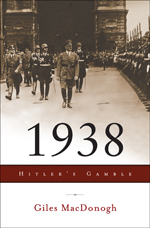 Interested in World War II, and the fateful years that led up to it? Then you must read the latest book by Giles MacDonogh, called 1938: Hitler's Gamble. It's a month by month account of the fateful year where Hitler first made his moves that would eventually lead to his domination of Europe, and a year where he could have been stopped if the Allied powers had had any willpower at all.
Interested in World War II, and the fateful years that led up to it? Then you must read the latest book by Giles MacDonogh, called 1938: Hitler's Gamble. It's a month by month account of the fateful year where Hitler first made his moves that would eventually lead to his domination of Europe, and a year where he could have been stopped if the Allied powers had had any willpower at all.My review of this book has now been posted to Curled Up With a Good Book, so I hope you will take a look at it. It's an excellent book, and a must-read for any World War II history buff out there.
"MacDonogh takes 1938 month by month, discussing various scandals that broke out among the German military and the in-fighting between members of the Nazi party such as Goering and Goebbels, who hated each other. There is the annexation of Austria in a nearly bloodless fashion (at least militarily, and if the Jews of Austria aren't counted). We see behind the scenes for the discussions of the Sudetenland annexation and the final invasion of Czechoslovakia. MacDonogh’s book culminates in the infamous Kristallnacht, two nights of murder and mayhem that brought the Nazi hatred of the Jews to the forefront."
MacDonogh is quickly becoming a must-read historian for me, as I also greatly loved his last book, After the Reich: The Brutal History of the Allied Occupation. That one is huge (this one's only about 300 pages), but it will keep you riveted.
"MacDonogh begins the book with the months leading up to the end of the war, as the Soviets were advancing through Poland and eastern Germany, raping and pillaging as much as possible. Revenge was a common motive, vengeance for every inhumane act the Nazis perpetrated on the Soviets during the almost four years of war. Others just gave in to their baser instincts. Heavily covered in this book, at the beginning and throughout, is how Austria figured into the whole issue. Many on both sides saw the Austrians as nearly as guilty as the Germans for what happened, yet it was always treated slightly differently. The fall of Vienna to the Soviets is the first chapter, and MacDonogh uses this as a stepping stone to detail just how horrible the Soviets treated everybody who lived behind the new front lines. Starvation as well as wanton rape were the main aspects of civilian life once the Soviets had passed."
I will definitely be keeping my eyes open for more MacDonogh books to come down the pike.
Give them a try!
















0 comments:
Post a Comment
Note: Only a member of this blog may post a comment.